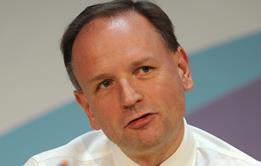Sir Simon Stevens’ note to NHS England colleagues, announcing his departure, this afternoon.
Dear colleague
I’m writing to let you know some personal news, which is that I have today formally confirmed to the NHS England Board my decision to stand down this summer after seven years as NHS chief executive.
Many of you have of course been expecting this - after all I took up this post on 1 April 2014. Back then, I answered the call with my eyes open, knowing about impending NHS funding pressures, the controversy at the time over the recently passed 2012 legislation, and the need to fundamentally reorientate the strategic direction of the NHS.
That has meant focusing on the big killers and causes of illness such as cancer and mental health, as well as strengthening primary care, integrating services, and moving towards local partnership working.
What I didn’t know was that we’d also be dealing with the political uncertainty of three general elections, three prime ministers, and a referendum. Let alone the worst pandemic in a century.
When covid first struck last Spring, the NHS responded with a speed and agility that confounded its critics. Hard work and innovation meant huge strides were also made in recovering services and tackling backlogs last summer and Autumn before the latest winter wave arrived – bigger and faster than the first. Who would have thought hospitals could admit more than 400,000 severely ill Covid patients – including over 100,000 in a single month – and still treat millions with other conditions? While simultaneously managing a national covid vaccination deployment that has been the fastest and most precise in the world?
That may have surprised some people, but it hasn’t surprised me. Thanks to the extraordinary skill and commitment of NHS staff right across the country, the reputation of the health service has never been higher, and public support deservedly never greater.
I started work for the NHS as on its 40th Birthday in 1988, and will leave this job as it turns 73. Joining the health service in my early twenties was one of the best decisions I’ve ever made, eventually followed three decades later by the privilege of leading the NHS through some of the toughest challenges in its history.
Over a period dominated by public funding constraints, NHS England has been reversing an historic injustice by increasing spending on both mental health and primary and community care as a proportion of the growing NHS budget.
We are making a reality of the long-cherished aim of joining up care across the NHS and beyond, with Integrated Care Systems now in place across the whole country. This will not just mean better care for patients, but puts rocket boosters under efforts to tackle inequalities and the deep causes of ill-health.
Improving patient care through the use of cutting-edge treatments and technologies is a key part of the NHS Long Term Plan. NHS England’s ability to negotiate these deals independently has allowed us to “think like a patient and act like a taxpayer”. The result? NHS patients were first in Europe to receive new CAR-T therapy, which can cure previously untreatable cancers; people with Cystic Fibrosis have benefited from groundbreaking new medicines; and we’ve recently struck a deal for the ‘world’s most expensive drug’ which treats a genetic disease that paralyses and often kills babies and young children. All this and more has been delivered at a cost that is fair to the public purse.
Having worked in a number of other health systems around the world, of course I know the NHS doesn’t have a monopoly on excellence, and doesn’t always get everything right – what human institution ever can? And by definition, the work of a nation’s health service will never be ‘done’.
But having agreed last year to stay on to see us through the pandemic pressures, now seems like a good time to hand on the baton. Covid inpatient numbers across England are down by 95% since their January peak. Our amazingly successful NHS covid vaccination campaign is well on track to have offered every adult their first jab – and everyone aged 50+ their second booster shot – by end of July. We’ve secured a workable financial settlement, elective care is ramping back up, and legislation should be published shortly to support the practical changes to care delivery and population health management that we’ve progressively been putting in place since the Five Year Forward View was published, reinforced through the NHS Long Term Plan.
As set out in the current legislation, the board of NHS England will now lead the open competitive recruitment process for my successor and the post will be advertised shortly. The aim is to have the appointment made by the time I step down on 31 July.
Over the past seven years it’s been a privilege to work with fantastic colleagues across NHS England and NHS Improvement, and to have brought the two organisations together while recruiting and supporting each of our exceptional team of national and regional directors.
You can be rightly proud of what the NHS has achieved – not just under the past year’s extreme test of the covid pandemic, but over the years before that too. I don’t know of any organisation in the world with a more talented and committed group of people working in pursuit of such a vital social purpose.
With best wishes,
Simon
Exclusive: Stevens to step down in July

Sir Simon Stevens is to stand down as chief executive of NHS England at the end of July, HSJ can reveal.
- 1
- 2
- 3
- 4
 Currently
reading
Currently
reading
Stevens’ leaving note: ‘The NHS’ reputation has never been higher’
- 6





































3 Readers' comments